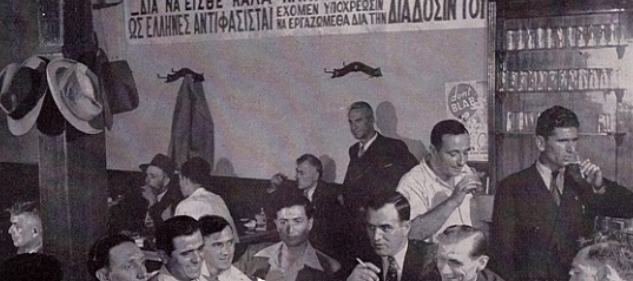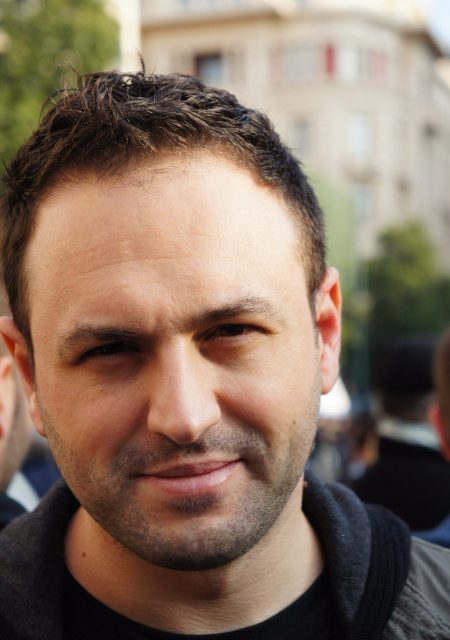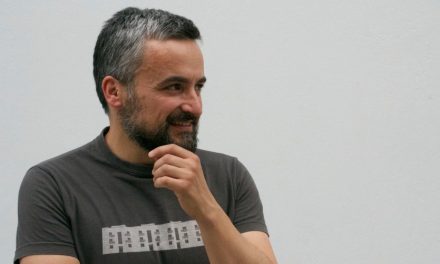Kostis Karpozilos (Ph.D. in History, University of Crete) is an A.G. Leventis Fellow at SEESOX, Oxford University, UK. He is the historical consultant and scriptwriter of the documentary Ταξισυνειδησία / Greek-American Radicals: the Untold Story as well as the editor of a book on the Cretan socialist intellectual Stavros Kallergis. Karpozilos has written extensively on the Greek crisis, the European Left and the limits of political imagination in the post-1989 world and he is currently working on an international history of the Greek Left.
Kostis Karpozilos spoke to Rethinking Greece* about Greek-American Radicalism, the current internationalization of the Greek story and the need for progressive reforms within a European radical project:
As the historian behind the “Ταξισυνειδησία / Greek-American Radicals” documentary you brought forward an alternative vision of Greek-American history that focuses on class and radicalism, challenging the more traditional “Struggle and Success” narrative. How did the Greek-American Community respond to this approach?
The realization that the Greek-American community is not a monolith was one of the most refreshing aspects of my experience with the Greek-American Radicals documentary. Its reception illustrated the multiple and diverse worlds of diasporic communities. The official institutions and organizations -that claim to represent the community- have proven to be quite indifferent or hostile to any narrative challenging the dominant “struggle and success” story (which in the meantime has transformed to “success and success”). On the other hand, in more than one occasion, I had the opportunity to engage in dialogue with a multifaceted Diaspora that associates its ethnic origins with contemporary social and political movements. Many Greek-Americans were active in the Occupy Wall Street movement, supported the documentary, organized screenings and more importantly, contributed with their own experiences and memories to the debate generated by the documentary itself. In a way their input reaffirmed one of the main arguments of “Greek-American Radicals”: that the untold stories of immigration and Diaspora deserve a place in history.
What is the connection, if any, to the history of the International, European and Greek Left? How does “Ταξισυνειδησία” touch upon the links between labor immigration and the contemporary global financial crisis?
In these past few days I have been writing the introduction to my forthcoming book on Greek-American Radicalism (Crete University Press, 2016). My opening scene draws a parallel between The New Colossus -the poem engraved on the Statue of Liberty- and The Internationale, the global hymn of the socialist movement. Both are written in the 19th century and make a call to the “wretched” of the earth. The geographical New World, the United States at that point, appears in dialogue with the socialist New World. This interplay between population movements and emancipatory narratives is integral to understanding the history of the Left. In the United States of the late 19th and early 20th century, labor migration proved to be pivotal in restructuring labor unions and radical politics. Being the wretched of the earth, the immigrants’ actions and visions transformed the American social landscape and gave rise to a phenomenal multiethnic working class movement. We cannot repeat history. What we have to address though, is why it is difficult to imagine contemporary refugees being at the forefront of a European Left in the years to come. This lack of imagination, I am afraid, illustrates a Left that has internalized its inability to listen to the voices of the “wretched” and, in turn, inspire a novel emancipatory narrative of social equality.
 You are currently working on an “international history of the Greek Left” project. Can you tell us more? Do you believe that the Greek Left constitutes a distinct case in the history of European Left or is it just a typical example?
You are currently working on an “international history of the Greek Left” project. Can you tell us more? Do you believe that the Greek Left constitutes a distinct case in the history of European Left or is it just a typical example?What I have been thinking of, is a concise history of the Greek Left demonstrating how, in pivotal moments, developments in the Greek Left encapsulated broader European and global transformations. Let me give you an example: the first socialist representatives in the Greek Parliament came from the multiethnic radical movements of Thessaloniki amidst the Balkan wars (1912-1913). Should we view this story -which remains largely unknown- as merely a Greek one, or should we see it as a Balkan moment that illustrates the demise of the multiethnic world of the Ottoman Empire and the collapse of the Second International? In the same manner I intend to discuss the Greek Civil War (1946-1949) as a key episode in the Cold War, the education of Asia Minor refugees in the Communist International schools in Moscow, the activities of Greek radicals abroad and the constant shaping and reshaping of the Greek Left as a national and international project. We should not forget that the Greek socialist movement was formulated in diasporic and immigrant communities and therefore, the networks connecting Greece with radicals abroad were consistently revitalized. Even today, the generation of intellectuals leaving the country due to the crisis has proven seminal to the internationalization of the Greek story, to linking the Greek crisis with the global capitalist crisis. This is by no means an exception- one can detect affinities with the Spanish or the Italian case, or even more geographically remote examples, as in the anti-imperialist and anti-colonial movements that were shaped by students and intellectuals in Paris, London and New York. The Left is by default an international and transnational phenomenon.
The SYRIZA government has been in power for almost a year in Greece, do you think that it still can reshape the austerity agenda?
This is indeed a difficult question. Just one year ago, even those of us who are quite skeptical, were temporarily convinced that there was a prospect for a meaningful change. This prospect did not only entail the anti-austerity agenda, but expanded to anticipating a radically different situation, with social movements generating dynamics in all spheres and transforming Greek society from the bottom-up. One year later this anticipation is in limbo. The setback in the financial negotiations is not the only reason. More importantly SYRIZA has proven to be very consistent in maintaining continuities with the existing state-structure and in doing politics in a old-fashioned way. Therefore the social, cultural and political movements that had flourished during the crisis are in crisis. In my view, this situation illustrates the problem of the Left being in power: our horizon has shrunk and we can only imitate the past; we don’t seem to be able to propose a vision for the future. SYRIZA, being supported by a popular majority, opted for a painful stability. In this context, I am afraid the main issue is not austerity; it is whether the Left is willing and able to propose radical reforms that will revolutionize conditions in Greece and challenge the long-standing inertias that remain in power.
 The financial and refugee crisis highlight Greece’s involvement in Europe’s contrasts. Can we re-think Greece as the country of progressive reforms within a European radical project?
The financial and refugee crisis highlight Greece’s involvement in Europe’s contrasts. Can we re-think Greece as the country of progressive reforms within a European radical project?In order to do so we definitely need a European radical project. At this stage there is none. The Left is failing to transform the social discontent with the European Union policies into a vision for a different Europe. In all its versions the Left appears to be trapped in history: either in nostalgia for national sovereignty or in the acceptance of the European Union as an indisputable structure. Both stances are vulnerable: reactionary euro-skepticism has been much more effective in raising notions of nostalgia for a seemingly harmonious past and the neoliberals are much more convincing when they defend the existing EU, since it is currently operating as a neoliberal project. The first step is for the Left to discuss its position towards the European Union structures and to chart an alternative European project for the 21st century. This is not an academic discussion and it cannot be fruitful by simply returning to the anti-EU or pro-EU positions of the past. It should be an open debate that takes into account the post-1990s structural changes within the European Union and the experiences of political alternatives shaped within this structure. How do we envision Europe in the 21st century? Reforms can still produce radical outcomes. The necessary prerequisite is to discuss what their content will be: the Left should illustrate the discrepancy between social inequality and the potential of our existing world. But this is not enough. What we actually need is visionary goals of social transformation that do not repeat the certainties and failures of the past. Otherwise, the failure of the Left will be the final triumph of the post-1989 ideological order.
*Interview by Nikolas Nenedakis, Athina Rossoglou
Watch the documentary Ταξισυνειδησία / Greek-American Radicals: the Untold Story @YouTube:
See also: Journal of Modern Greek Studies (May 2015): Interview with Kostis Karpozilos; Despina Lalaki: Comments on the documentary Taxisinidisia, Greek American Radicals – The Untold Story (Chronos Magazine, 2014)














